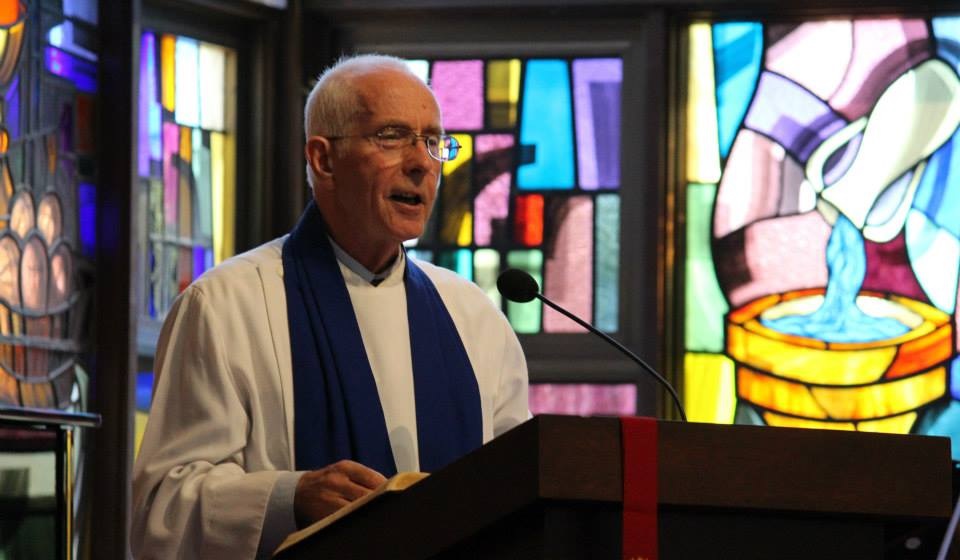with Rev. Prof. Dean Drayton

The Kingdom of God
What would happen if the core of Jesus’ message was misunderstood? Certainly all that he did and proclaimed was about the kingdom of God present in space and time. Yet when this kingdom of God is spoken about today it is so often claimed,or assumed “the kingdom of God is within you.” What an extraordinary collapse of the kingdom into somewhere within a person. It is an outright denial of Jesus’ proclamation that the kingdom of God is at hand. If the kingdom is within, how does one respond to Jesus’ invitation to enter into this kingdom. There is no way the kingdom can be restricted to my personal domain.
Day after day Jesus proclaimed the kingdom of God in kingdom parables, teaching and actions, healing and liberating people. He called on those listening ‘to enter the kingdom of God’. He said the kingdom was available, at hand, among his hearers, breaking in upon them. It was certainly not in them. A person needed to ‘enter the kingdom,’ to be in the kingdom. In the first three Gospels the kingdom of God is found 42 times and 2 in the Gospel of John. It is the core of Jesus message before he faced the cross. Then Luke also stresses that the resurrected Jesus spent the forty days between the resurrection and his ascension ‘speaking about the kingdom’
So how could so many believe or be convinced ‘that the kingdom of God is within us’?
It is all based on the 1611 King James translation of only one verse, Luke 17:20, 21.
And when he was demanded of the Pharisees, when the kingdom of God would come, he answered them and said, ‘the kingdom of God cometh not with observation: Neither shall they say, Lo here! or Lo there! for the kingdom of God is within you.’
The particular translation of this passage depends upon one preposition that can be translated ‘in’ or ‘among’. In the 20th century a better understanding of Hebrew, and a look at the context have ruled out ‘in’ as a translation and instead have either ‘the kingdom of God is in your midst’ or ‘among you”. Have a look at the passage in any of the modern translations.
In this confrontation the Pharisees are demanding that Jesus show them this kingdom. It is not a friendly encounter. Jesus makes it clear that they cannot see it. In fact they are oblivious to the kingdom that is among them.
Two observations.
Firstly it is an illustration of the power of culture and common understanding. Old habits and views die hard. We hardly know we are doing it when we let the individualism of our age interpret the scriptures. If the default position you hold is ‘the kingdom of God is within you’ give it up. So much of common understanding is not correct. Another example -Nowhere is it said in the Bible ‘Godliness is next to holiness’!
Secondly this passage reinforces the other kingdom passages that religion is not a personal matter, it is a declaration of the way the Spirit of God is at work in the world, society, community and the individual, that is in our midst. Belief is not just about what I am committed to, what I have convictions about, what I think is true and good. We are called to discover the way God’s reality is present in this world of space and time, confronting power and authority to bring about God’s peace for each of us.
It makes a big difference. God is not only a subjective feeling within, or our commitment or conviction. It is more like discovering Jesus standing alongside us, as he did this group of Pharisees. The kingdom of God is another reality, another world that is so different to our view. It leads to an important question. So how does one enter this kingdom God?

Rev. Prof. Dean Drayton
(호주 연합교단 증경 전국총회장, 이이오나 트리니티 대학 이사장)
하나님 나라 (The Kingdom of God)
예수님의 핵심 메시지가 오해된다면 심각한 문제가 발생할 것이다. 예수님께서 행하신 모든 일과 선포하신 말씀은 시간과 공간 속에서 임하는 하나님 나라에 대한 것이었다. 그러나 오늘날 하나님 나라를 이야기할 때, 흔히 “하나님 나라는 너희 안에 있다”고 주장하거나 가정하는 경우가 많다. 이는 하나님 나라를 개인의 내면으로 축소해 버리는 오류이다. 예수님의 선언인 “하나님 나라가 가까이 왔다”는 말씀을 정면으로 부인하는 것이다. 만약 하나님 나라가 오직 우리 안에 있는 것이라면, 우리는 어떻게 예수님의 초대에 응하여 그 나라에 들어갈 수 있을까? 하나님 나라는 결코 개인의 내면으로 제한될 수 없는 것이다.
예수님께서는 날마다 하나님 나라를 선포하셨다. 비유로 가르치고, 행동하며 치유하고, 사람들을 자유롭게 하셨다. 그리고 “하나님 나라에 들어가라”고 초대하셨다. 예수님께서는 하나님 나라가 사람들 가운데 있으며, 그들에게 임하고 있다고 말씀하셨다. 그것은 분명 사람들의 내면에 존재하는 것이 아니었다. 한 사람이 하나님 나라에 “들어가야” 했고, 그 나라 안에 “속해야” 했다. 하나님 나라는 신약 성경에서 매우 중요한 개념이다. 마태, 마가, 누가복음에서 42번 등장하며, 요한복음에서도 2번 기록되어 있다. 십자가를 지시기 전까지 예수님의 핵심 메시지는 하나님 나라였다. 그리고 누가복음은 예수님께서 부활 후 승천하시기까지 40일 동안 하나님 나라를 말씀하셨다고 강조한다.
그렇다면 어떻게 이렇게 많은 사람들이 “하나님 나라가 우리 안에 있다”는 믿음을 가지게 되었을까?
이는 오직 한 구절, 누가복음 17:20-21에서 비롯된 오해이다. 1611년 킹 제임스 성경(KJV)이 이 구절을 다음과 같이 번역했기 때문이다.
“바리새인들이 하나님 나라가 언제 올 것이냐고 묻자, 예수께서 대답하셨다. ‘하나님 나라는 눈으로 볼 수 있게 오는 것이 아니며, 사람들이 여기 있다, 저기 있다 할 수도 없다. 하나님 나라는 너희 안에 있느니라.'”
여기서 “너희 안에 있다”는 번역은 단 하나의 전치사 선택에 따라 결정된다. 이 단어는 “in”(안에) 또는 “among”(가운데)으로 번역될 수 있다. 그러나 20세기에 이르러 히브리어에 대한 더 깊은 이해와 문맥적 분석을 통해 “in(안에)”이라는 번역이 부적절하다는 것이 확인되었다. 대신 “하나님 나라는 너희 가운데 있다” 또는 “너희 중에 있다”라는 번역이 더 정확하다고 평가받았다. 현대 번역 성경을 보면 이러한 수정된 표현을 확인할 수 있다.
이 장면에서 바리새인들은 예수님께 “하나님 나라를 보여 달라”고 요구한다. 이는 호의적인 질문이 아니다. 오히려 예수님을 시험하는 공격적 질문이었다. 예수님께서는 그들에게 “너희는 하나님 나라를 보지 못한다”고 선언하셨다. 실제로 그들은 예수님이 하나님 나라를 이미 그들 가운데 선포하고 계심에도 이를 전혀 깨닫지 못하고 있었다.
여기서 두 가지 중요한 점을 짚어볼 수 있다.
첫째, 이는 문화와 통념의 힘을 보여준다. 익숙한 관념과 오래된 습관은 쉽게 바뀌지 않는다. 우리는 종종 성경을 시대적 개인주의적 관점에서 해석하는 것이다. 만약 당신의 기본 관점이 “하나님의 나라는 내 안에 있다”라면, 이제 그것을 내려놓아야 한다. 일반적인 통념이 언제나 진리인 것은 아니다. 예를 들어, “경건은 거룩함의 다음 단계이다 (Godliness is next to holiness)”라는 말은 성경 어디에도 나오지 않는다.
둘째, 하나님 나라는 개인적인 것이 아니라 공동체적인 것이다. 이 본문은 하나님 나라가 개인적 내면에만 존재하는 것이 아니라, 세상 속에서 역사하는 하나님의 능력임을 보여주는 것이다. 하나님 나라는 우리 사회와 공동체, 그리고 우리가 살아가는 시간과 공간 속에서 실재하는 역사이다. 신앙이란 내가 개인적으로 믿는 신념과 확신을 넘어, 하나님의 현실이 이 땅에서 어떻게 임하며 권력과 체제를 변화시키고 하나님의 평화를 이루시는지를 발견하는 여정이다.
우리는 단순히 하나님을 내면의 느낌이나 신념으로 제한해서는 안 된다. 하나님 나라는 우리의 결심이나 확신이 아니라, 이 땅에서 실제로 임하는 하나님 나라의 현실이다. 하나님 나라는 마치 예수님께서 바리새인들 옆에 서 계셨던 것처럼, 우리 삶 가운데서 지금도 역사하시는 하나님의 능력이다. 하나님 나라는 우리가 익숙한 세상과는 전혀 다른 실제적 다른 세계이다. 그렇다면, 우리는 어떻게 하나님 나라에 들어갈 수 있을까?
번역 = 김환기 사관
크리스천라이프 편집부

